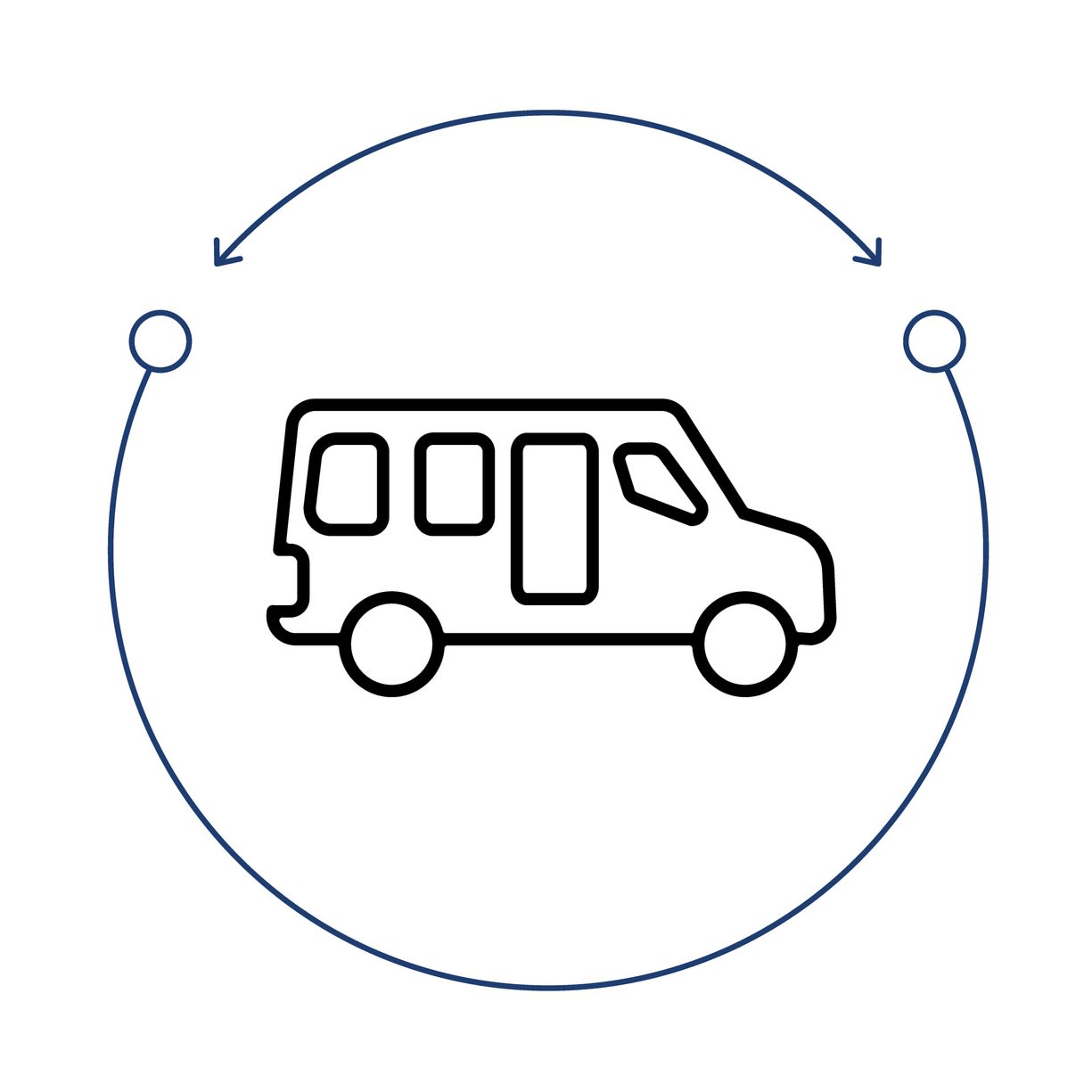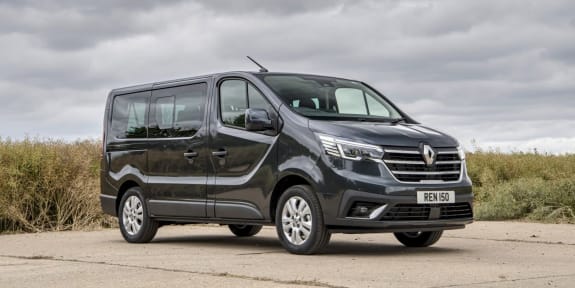This is the third car Jamie has supplied to me via Select, always a pleaseure to do business with, would definatley reccomend!
Ford Transit Minibus
With up to 18 seats available, and various wheelbases and heights to choose from, the Ford Transit Minibus ensures there’s always room for everyone - no matter your destination.

Volkswagen Transporter Shuttle Medium Van
With space for up to nine, the Transporter Shuttle is a firm favourite for regular taxi journeys to venues, airports and in large towns and cities.
models available
models

Ford Tourneo Custom Medium Van
Bringing all the quality you would expect from a Ford, the Tourneo Custom Medium van is a premium 9-seat people-carrying version of the Transit Custom van.
models available
models

Mercedes Vito Tourer Medium Van
The Vito Tourer is a people-carrier from Mercedes-Benz, based on the popular Vito panel van. There are three wheelbases to choose from, all of which have room for nine passengers and a payload of 1,004kg.

Renault Trafic Minibus
The Trafic Passenger Minibus from Renault is based on the regular Trafic panel van, and features nine seats, frugal diesel powertrains, and a choice of two different wheelbases.

Minibus leasing in three simple steps

1. Choose your minibus:
Whether you need a minibus with 9, 12, 14 or 16 passenger seats, secure an affordable lease package with Select Van Leasing.

2. Get everything you need:
Select the trim level and add-in extras - such as maintenance and insurance - for extra peace of mind.

3. Take delivery:
Our team of minibus leasing consultants will guide you through the entire process and arrange delivery once the paperwork is completed.
Who can drive a minibus?
If you passed your driving test before 1 January 1997:
If someone passed their regular driving test - aka the ‘category B’ car test - before 1 January 1997, then they are automatically entitled to drive a ‘D1’ minibus with up to 16 passenger seats.
There’s no maximum weight limit.
But there are still some important provisos.
You are NOT allowed to drive a minibus for ‘hire or reward’ - ie, the legal term for accepting payment for providing transport.
And be sure to check:
- That your driving licence includes the code D1 (101).
- That your D1 entitlement has not been removed – it can expire when you reach 70 years old and it may also be removed for medical reasons.
- Drivers with a D1 + E (101) entitlement can tow a trailer over 750kg
If you passed your driving test on or after 1 January 1997
The rules here are slightly more complicated, but there’s still plenty of flexibility.
If you passed your car driving test on or after 1 January 1997, you’re not automatically entitled to drive a D1 minibus.
However, the Motor Vehicles (Driving Licences) Regulations 1999 introduced a degree of wriggle room, which allows for some individuals to drive ‘out of category’ in certain circumstances.
- You can still drive a minibus with up to 16 passengers on a car licence obtained on or after 1 January 1997 so long as:
- It is NOT being used for hire or reward.
- You are 21 or older.
- You have held a category B car driving licence for at least two years.
- You are driving the minibus on a voluntary basis and the minibus is used for social purposes by a non-commercial body.
- The maximum weight of the minibus does not exceed 3.5 tonnes - or 4.5 tonnes if it is fitted with specialist equipment to improve disability access.
- You meet ‘Group 2 Fitness to Drive’ medical standards if you’re over 70 years old.
- You are not towing a trailer.
- You do not drive abroad.
Section 19 permits
Section 19 permits relate to any organisation - such as schools, colleges, youth groups and care homes - that operates a minibus without a view to make a profit, but which still needs to cover running costs. It relates to non-commercial, not-for-profit activities.
But you’re still able to pay your driver(s) as part of your running costs.
The organisation will typically be concerned with:
- Education
- Religion
- Social welfare
- Recreation (standard permits only)
- Other activities of benefit to the community
What a Section 19 permit does is replace the need for a so-called PSV (Public Service Vehicle) operator’s licence, which is typically required when you’re operating a vehicle for hire or reward that can carry 9 or more passengers.
You can apply for a permit via the Traffic Commissioner website at a cost of £11 (at the time of writing).
Once your application is complete, the permit will arrive as a small disk that needs to be displayed in the windscreen of your minibus. It’s valid for five years.
And as a permit holder, you have a responsibility to make sure that your services are operated within the law, with vehicles properly maintained and using drivers with the appropriate qualifications.
There are a few key things to remember about a Section 19 permit:
- If you lend your minibus to another school, youth group, or organisation, they will need their own Section 19 permit.
- You’re required to hold a permit for each minibus used by your organisation.
- You need to inform the DVSA of any changes to your organisation. For example, if your school changes its name or becomes an Academy.
- If your permit fades in the sun, you’ll need to apply for a new one.
Section 19 permit responsibilities:
If you’ve been granted a Section 19 permit, there are key requirements:
- You’re not permitted to carry members of the general public.
- Vehicles must be well-maintained, serviced and hold a valid MOT.
- You need to provide evidence of regular minibus inspection and maintenance; which includes daily checks and more thorough safety inspections at least every 10 weeks.
- Drivers must be at least aged 21, properly trained, hold the correct licences, and take appropriate breaks.
Why lease a minibus?
There are some major benefits to leasing a minibus rather than purchasing one outright, including some important tax implications and key budgeting advantages.
- Here’s some of the great things about leasing a minibus with Select Van Leasing;
- Low initial outlay: You’ll pay a small initial fee up front, rather than having to spend tens of thousands of pounds purchasing a new minibus outright.
- Avoid depreciation: The value of new vehicles can fall considerably after three years of ownership - you can avoid that cost through leasing.
- Fixed monthly payments: Enjoy the peace of mind that comes with affordable monthly payments for the duration of your contact.
- Complete cover: Talk to our specialist minibus leasing consultants about additional packages that includes maintenance, insurance, MOTs, fleet management and safety inspections.
- Improved tax efficiency through VAT benefits.
Driving for hire or reward
No matter what sort of car licence you’ve got, you are NOT allowed to charge passengers in your minibus without applying to the DVSA for a special permit.
If you want to make money from operating a minibus, above and beyond simply covering running costs, then you need to apply for both a Passenger Carrying Vehicle (PCV) licence and a Public Service Vehicle (PSV) licence, which requires extra training and examinations.
Safety Checks and Inspections
When you lease a minibus, you benefit from a modern vehicle that’s protected by a manufacturer’s warranty.
But all leased minibuses should still be checked by the driver prior to every journey, and given a thorough inspection by a qualified engineer at least every 10 weeks.
You can find an example of an appropriate safety inspection record at the end of the Section 19 permit application form.
The Royal Society for the Prevention of Accidents (RoSPA) also offers a downloadable pre-drive safety checklist, which includes everything from making sure mirrors are clean and adjusted correctly, to logging the locations of first aid kits and fire extinguishers, and ensuring coolant and oil levels are correct.
Insurance
Having the appropriate insurance cover is crucial when you’re operating a minibus, and it’s vital that schools, colleges, youth groups and care homes - to name just a few examples - are protected.
Many insurance providers offer specialist policies that cover minibus use - aimed at passenger-carrying vehicles larger than cars but not as big as coaches.
It’s recommended that the insurance policy covers:
- All the services for which the minibus is used
- The number of passengers allowed and the total weight (including passengers and luggage)
- All the people authorised to drive the minibus
- Journeys for which passengers pay a contribution.
Electric Minibuses
More and more manufacturers now offer fully-electric minibuses, in the form of vehicles like the nine-seat Vauxhall Vivaro Electric and the Mercedes-Benz e-Vito Tourer.
The benefits of operating a battery-powered minibus are numerous, particularly for schools and colleges looking to reduce their carbon footprint. You can enjoy:
- Lower fuel costs than a traditionally-fuelled minibus.
- A reduction in harmful CO2 emissions, particularly around vulnerable youngsters in school or care settings.
- ULEZ (Ultra Low Emission Zone) compliance and cost reduction.
- Potential tax benefits.
- Electric minibuses with wheelchair access.
- An EV minibus with a substantial payload, with loads continually improving.
- An electric minibus with a smooth, silent, relaxing ride quality, while service intervals are also longer than for a minibus with an internal combustion engine.
Minibus leasing - Frequently Asked Questions
With Select Van Leasing you can choose from the very best minibuses from all the major manufacturers, including Mercedes-Benz, Renault, Nissan, Vauxhall and Ford. There are a range of sizes available, with seats for 9, 12, 14, or 17 people, including the driver. You can lease a minibus with wheelchair access. And you can also enjoy one of the new breed of electric minibuses, such as the Renault Master ZE or the Fiat E-Ducato.
Some vehicles, such as the Ford Transit Minibus, are created by the manufacturers’ specialist team of in-house technicians. Other minibuses are sourced from a coachbuilder that acts as an official partner to the manufacturer. Those firms include GM Coachwork and Stanford Coachworks. Whichever option you choose, the minibus will be built to rigorous standards and in-line with industry regulations.
The rules here are slightly complicated - please read the information above for a full description on who can drive a minibus, and also what a minibus can be used for.
Leasing a minibus can be a much more affordable way to carry people when compared to purchasing outright. And that’s true whether you’re ferrying a school sports team to a match, or you’re ferrying colleagues to a site.
Leasing means you pay a low initial fee and then enjoy fixed monthly payments that stay the same for the duration of your contract. You can also add additional packages for extra peace of mind, which cover things like maintenance, insurance, safety inspections, MOTs and breakdowns.
It is - and it can be subsequently claimed back through your VAT return. It’s another benefit of leasing a minibus when it comes to managing your budget.
I had a great experience working with Niall to get my Kia Sportage through Select Car Leasing. Niall was prompt, helpful, and patient as I explored which car and leasing plan was best for me. The communication was great, keeping me up to date with my order processing and car delivery. The delivery was smooth and easy with clear communication on timings and expectations on when my car would arrive, making the process stress-free. My car arrived within a month of placing my order and they made sure I had all the information I needed to be able to grab the keys and go when it arrived. I'd highly recommend Niall and Select Car Leasing if you want a smooth, stress-free, and affordable leasing experience.
Very responsive to my initial enquiry - moved very quickly through all the steps and ultimately got me a new car on the drive exactly when originally promised! I was particularly impressed with the way my consultant helped to support me in addresing queries from the finance company and resolve them in a good time - thankyou Matt!














